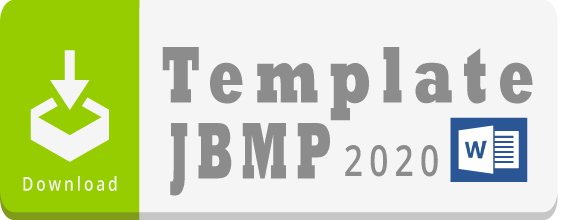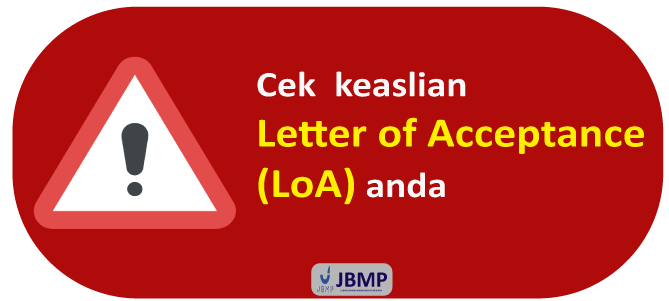Evaluasi implementasi program kerja guru dalam merancang pembelajaran
 ), Istaryatiningtias Istaryatiningtias(2), Bunyamin Bunyamin(3),
), Istaryatiningtias Istaryatiningtias(2), Bunyamin Bunyamin(3), (1) Administrasi Pendidikan, Universitas Muhammadiyah Prof. DR. HAMKA
(2) Administrasi Pendidikan, Universitas Muhammadiyah Prof. DR. HAMKA
(3) Administrasi Pendidikan, Universitas Muhammadiyah Prof. DR. HAMKA
 Corresponding Author
Corresponding Author
DOI : https://doi.org/10.24036/jbmp.v10i2.115587
Full Text:
 Language : id
Language : id
Abstract
Penelitian ini bertujuan untuk mengevaluasi implementasi program kerja guru dalam merancang pembelajaran dengan menggunakan metode mixed methods (metode campuran: kuantitatif dan kualitatif). Pengumpulan data dilakukan dengan wawancara, observasi, dan kuesioner dalam bentuk tes yang disebar ke sampel yang berjumlah 10 orang guru yang mengajar mata pelajaran kejuruan. Analisis data secara kuantitatif menggunakan uji paired test. Hasil penelitian adalah guru dalam merancang pembelajaran sudah efektif berdasarkan hasil post test (setelah mengikuti pelatihan) sebagian besar mengalami peningkatan nilai dan hasil uji paired tes menunjukkan nilai yang sama antara pre test dan post test dengan arti tidak ada perbedaan nilai antara sebelum dan sesudah mengikuti pelatihan. Dan hasil temuan ini memberikan maksud bahwa guru termotivasi dalam mengikuti pelatihan perancangan pembelajaran sebagai wujud dari program kerja guru yang dibutuhkan guru pada penerapan kurikulum yang meliputi komponen kognitif berdasarkan kompetensi yang mengacu pada standar pendidikan.
Keywords
References
A.K. Kulshrestha, K. P. (2013). Teachers Training and Professional Competencies. Voice of Research, 1(4), 29–33.
Abid, N. M. (2021). Problematika Guru dalam Perencanaan Pembelajaran Tematik Pembahasan. Retrieved from https://dosenmuslim.com/pendidikan/problematika-guru-dalam-perencanaan/
Averill, R., Drake, M., Anderson, D., & Anthony, G. (2016). The use of questions within in-the-moment coaching in initial mathematics teacher education: enhancing participation, reflection, and co-construction in rehearsals of practice. Asia-Pacific Journal of Teacher Education, 44(5), 486–503. https://doi.org/10.1080/1359866X.2016.1169503
Bennett, R. E. (2011). Formative assessment: A critical review. Assessment in Education: Principles, Policy and Practice, 18(1), 5–25. https://doi.org/10.1080/0969594X.2010.513678
Chwialkowska, A. (2020). Maximizing Cross-Cultural Learning From Exchange Study Abroad Programs: Transformative Learning Theory. Journal of Studies in International Education, 24(5), 535–554. https://doi.org/10.1177/1028315320906163
Cilliers, J., Fleisch, B., Prinsloo, C., & Taylor, S. (2020). How to Improve Teaching Practice? (Formula presented): An Experimental Comparison of Centralized Training and In-Classroom Coaching. Journal of Human Resources, 55(3), 926–962. https://doi.org/10.3368/jhr.55.3.0618-9538R1
Creswell, W. John & Creswell, J. D. (2018). Research Design: Qualitative, Quantitative and Mixed Methods Approaches. In Journal of Chemical Information and Modeling (Vol. 53).
Donaldson, C. D., Siegel, J. T., & Crano, W. D. (2020). Preventing college student nonmedical prescription stimulant use: Development of vested interest theory-based persuasive messages. Addictive Behaviors, 108(February), 106440. https://doi.org/10.1016/j.addbeh.2020.106440
Gareis, C. R., & Grant, L. W. (2015). Teacher-Made Assessments (second edi). New York: Routledge Taylor & Francis.
Gegenfurtner, A., Knogler, M., & Schwab, S. (2020). Transfer interest: measuring interest in training content and interest in training transfer. Human Resource Development International, 23(2), 146–167. https://doi.org/10.1080/13678868.2019.1644002
Han, J., & Yin, H. (2016). Teacher motivation: Definition, research development and implications for teachers. Cogent Education, 3(1), 1–18. https://doi.org/10.1080/2331186X.2016.1217819
Hsieh, F. P., Lin, H. shyang, Liu, S. C., & Tsai, C. Y. (2019). Effect of Peer Coaching on Teachers’ Practice and Their Students’ Scientific Competencies. Research in Science Education, (70). https://doi.org/10.1007/s11165-019-9839-7
Kirkpatrick’s, D. L. (2009). Donald L Kirkpatrick’s training evaluation model - the four levels of learning evaluation. 1–9. Retrieved from www.goodworkplaces.net
Klarin, M. (2015). The New Educational Practice of Coaching, and the New Profession of the Coach. Russian Education and Society, 57(6), 415–428. https://doi.org/10.1080/10609393.2015.1096131
Knoester, M., & Parkison, P. (2017). Seeing Like a State: How Educational Policy Misreads What is Important in Schools. Educational Studies, 53(3), 247–262. https://doi.org/10.1080/00131946.2017.1297302
Kurki, V. A. J. (2018). Rights, harming and wronging: A restatement of the interest theory. Oxford Journal of Legal Studies, 38(3), 430–450. https://doi.org/10.1093/ojls/gqy005
Liakopoulou, M. (2011). The Professional Competence of Teachers : Which qualities , attitudes , skills and knowledge contribute to a teacher ’ s effectiveness ? International Journal of Humanities and Social Science, 1(21), 66–78.
Permendikbud. (2018). Permendikbud Beban Kerja Guru Kepala Sekolah. Journal of Chemical Information and Modeling, 53(9), 1689–1699.
Stillman, G. A. (2021). Learning of Mathematical Modelling Mathematical Modelling in Education Research and Practice Cultural , Social and Cognitive Infl uences. https://doi.org//10.1007/978-3-030-66996-6
Uzumcu, O., & Bay, E. (2020). The effect of computational thinking skill program design developed according to interest driven creator theory on prospective teachers. Education and Information Technologies. https://doi.org/10.1007/s10639-020-10268-3
Willis, J., Adie, L., & Klenowski, V. (2013). Conceptualising teachers’ assessment literacies in an era of curriculum and assessment reform. Australian Educational Researcher, 40(2), 241–256. https://doi.org/10.1007/s13384-013-0089-9
Windschitl, M., Thompson, J., Braaten, M., & Stroupe, D. (2012). Proposing a core set of instructional practices and tools for teachers of science. Science Education, 96(5), 878–903. https://doi.org/10.1002/sce.21027
 Article Metrics
Article Metrics
 Abstract Views : 697 times
Abstract Views : 697 times
 PDF (Bahasa Indonesia) Downloaded : 177 times
PDF (Bahasa Indonesia) Downloaded : 177 times
Refbacks
- There are currently no refbacks.




